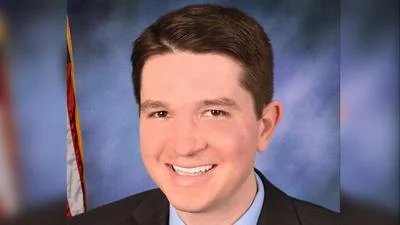Rep. Blaine Wilhour | Facebook / Blaine Wilhour
Rep. Blaine Wilhour | Facebook / Blaine Wilhour
State Rep. Blaine Wilhour (R-Beecher City) is opposed to legislation that would create ranked-choice voting statewide.
Wilhour, who sits on the House Ethics and Elections Committee, pledged to block the bills that would change the election process. He believes "elections should be free and fair and each person should have one vote – not two or three." He vowed to keep his oath to uphold the Constitution.
“We are facing an unparalleled assault on our Constitutional Republic,” Wilhour told South Central Reporter. “Far-left activists are working to give non-residents of our country the right to vote. They are pushing legislation to give convicted felons the right to vote, and they are actively seeking ways to make it easier for political operatives to utilize ballot harvesting and other unsavory practices to give Democrats a better chance of winning elections.”
He dubbed the bills 'the latest innovations from the left.' Slated to start with the primaries, Wilhour said, it will eventually "become the norm in Illinois.”
“We don’t need to complicate our electoral process even more than it already is," Wilhour continued. "Our focus should be on ensuring ballot integrity. Let’s prevent people from stealing elections and put some real election reforms in place.”
Bills under consideration are HB2807, which creates the system for presidential elections, and HB3749, which creates the system for municipal elections.
“Creates the Ranked Choice Voting for Presidential Primaries Act. Provides that any State-administered primary election for the President of the United States shall be conducted using ranked choice voting,” HB2807's synopsis reads. “Sets forth provisions concerning form of ballot, tabulation, inactive ballots and undervotes, and ties for ranked choice voting. Provides that at least 150 days before the date of the presidential primary election, the State committee of each political party that intends to use the State-administered presidential primary in its nomination process shall inform the State Board of Elections in writing of its intention. Provides that the State committee’s written notice shall indicate whether the party prefers tabulation to occur on a winner-take-all basis or on a proportional basis.”
Ranked-choice voting, also known as instant runoff voting, would create an open primary in which voters are allowed to rank the candidates in the order of favor. If no candidate received more than 50 percent of the vote as the first choice the vote then goes through rounds in which low-count vote-getters are eliminated until candidates are chosen based on their ranking in the balloting process.
According to Ballotpedia, “If a candidate wins a majority of first-preference votes, he or she is declared the winner." However, If none of the candidates win a majority of first-preference votes, "the candidate with the fewest first-preference votes is eliminated. First-preference votes cast for the failed candidate are eliminated, lifting the next-preference choices indicated on those ballots. A new tally is conducted to determine whether any candidate has won a majority of the adjusted votes."
The Illinois Opportunity Project’s Andy Bakker told WJBC the legislation will have a detrimental effect on the state’s election process. According to Bakker ranked-choice voting is a strategy to "disconnect elections from issues and allows candidates with marginal support to win.”
The introduction of ranked-choice voting would require new voting systems throughout the state as well. Boone County Clerk Julie Bliss told legislators debating the bill in committee that expense and funding for this electoral system will be concerns raised to the lawmakers by all local election authorities, Capitol News Illinois reported. She warned that "the initial cost of implementing something like this is going to be higher.”


 Alerts Sign-up
Alerts Sign-up